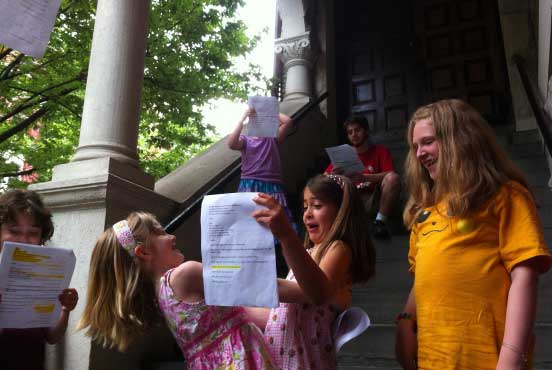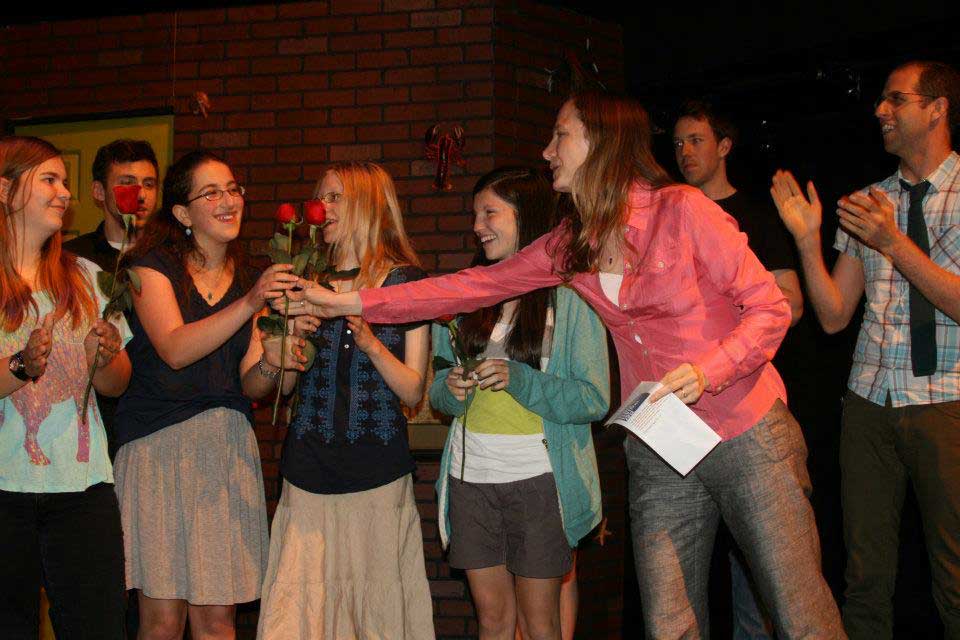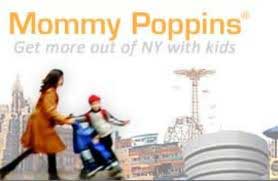10/4/2012
By Rebecca Wallace-Segall, Founder and Executive Director of Writopia Lab (Read Rebecca's bio)

Some fiction and memoir programs are a waste of classroom time. Others sharpen students' thinking and provide them with unmatched insight. Good teachers know the difference.
"I'm not sure if eight-year-olds should be permitted to have death or murder references in their short stories," said a New York City public school principal to me at the end of the day today. "But I'll set a meeting with my teachers tomorrow to discuss your views and theirs and see where we get."
Three hours later, I am still moved and humbled by the principal's thoughtful consideration of a topic so new and strange to her. We had just started a residency in her school. We had discussed a no-censorship approach for this workshop and the children had immediately come to life when they were told they could write a fictional story about anything they wanted.
But by week two, some of the teachers were concerned to see the heavy material that emerged, here and there, throughout the grade, from the special ed class to the "gifted and talented." Human beings young and old love exploring dark, fantastical themes. But what are we supposed to think when our youngest members do it? When should our admiration turn to worry, and when does it become a school's responsibility?
It is not easy to teach creative writing within the confinement of school. It is not easy to tackle the issues that arise, and it's not easy to learn how to teach fiction and memoir writing well. But it is possible. And many teachers are doing it, and doing it well, across the country.
David Coleman, the cynical architect of the new curriculum that will be imposed on public schools in 46 states over the next two years, is trying to reverse an education trend "that favors self-expression and emotion over lucid communication." But skilled teachers of creative genres have always known that all good writing requires lucid communication. It is impossible to teach any form of writing without applying and celebrating analytic concepts and mechanical precision.
If young people are not learning to write while exploring personal narratives and short fiction, it is because we as educators need more training — or the specifics of the curriculum need development. It is not because those forms of writing in themselves are of no use.
Where will we be if we graduate a generation of young people who can write an academic paper on the Civil War but have no power to convey the human experience?
There's a reason fiction and narrative nonfictionoutsell all other genres in the U.S. It's the same reason there are 56 million WordPress blogs and 76 million Tumblrs. Human beings yearn to share, reflect, and understand one another, and they use these reflections to improve the state of things, both personal and public. If we want our students to have this kind of impact, we have to teach them to express themselves with both precision and passion.
My own non-profit partners with schools on serious fiction and memoir writing programs. We know it is possible to implement high-level creative writing instruction for young people because our students win more Scholastic Writing Awards each year than any other group of children and teens in the nation. Not all creative writing curricula are created equal, and we stay true to our vision as we help eight-year-olds learn to write compelling, coherent short stories with creative transitions, character wants, obstacles, climax, dialogue, and resolve.
In our work, we're reminded again and again that fiction writing is as important as any other genre for children and teens as they learn to write. It not only provides them with a safe space to make sense of the human dynamics around them, but it teaches them writing at the highest level, going beyond lucidity into the realm of literary tension, and then further into humor, narrative complexity, abstraction, and metaphor.
Our writers put arguments forth, embedded within well-organized, linear narratives in various voices. The themes of their fiction then inspire the deepest of dialogues in the classroom, spur debates about race and class assumptions and other social issues, and invite empathy. As we like to say at Writopia, plot builds character. This type of dynamic discourse helps our students grow as people and thinkers — and of course, as writers.
And, on top of it all, it's engaging. When we work with students on creative pieces, they become riveted by their stories before the end of the first lesson. Children with class-based literacy issues love trying their hand at fiction; elite children of famous authors love it as well. Students across America should write fiction before anything else, and they should continue to work on it side-by-side with academic writing. They should be given creative assignments as a reward for writing a fabulous research paper.
What's more, a piece of fiction can be persuasive, and a memoir can be informative. Educators who are serious about this kind of writing make sure each piece is workshopped until it is compelling. And honest. And revealing of human nature. And sometimes funny, but always surprisingly complex to the outsider. As at New Dorp, the high school profiled in a recentAtlantic article, our students learn transition words, or "coordinating conjunctions," as they write. In some cases, they begin to grasp these concepts as young as eight years old.
Creative writing can be vulnerable work, so we usually dive into story first and analyze sentences and structure toward the end. But literacy issues necessarily come up along the way, and they are addressed. How can one write an impactful story without properly using "although," "but," and "unless," or without considering if/then, why, and how? How can anyone write an award-winning or even publishable story without establishing a strong sense of character or providing illustrative evidence?
Creative writing also provides something that no number of expository assignments can. The insights and challenges that arise when we face when teaching uncensored fiction are surpassed only when we teach uncensored memoir writing. When I first started teaching creative writing in schools, Rami, one of my light-hearted 7th grade boys, had been working on a memoir with me for a month and finally decided to share it with a small workshop of his peers. It was about not feeling masculine. We were all stunned. I caught sight of one girl holding his hand for support.
These moments of self-awareness are rare in a typical classroom, and all it takes is one adult to shatter them. When the principal of Rami's school became privy to the memoir, she simply scoffed, "Oh, Rami, trying to get attention again." Rami turned pale; he didn't write again for months. Thankfully, later that year, he won a regional Scholastic Award for his memoir.
When David Coleman remarked that "no one gives a shit" about how kids think and feel, perhaps he was only exaggerating to make his point — which was that thoughts and feelings don't make an impact unless they're bolstered by skill and evidence. But there truly areeducators, like Rami's principal, who don't care about self-expression. Their detachment is not helping students become better writers. Instead, it is sending a message that nothing they have to say is worthwhile, especially if it is about something personal.
For now, children across the country continue to write personal narratives within schools. Some of them are engaged in it, some are bored by it, and some hate it. Some write well-crafted, reflective pieces, while others speak superficially about the minute details of their lives. Some struggle with basic literacy issues. Others struggle with psychological barriers that keep them from writing. Some teachers have made an art of teaching narratives. Others are frustrated because they've been stuck with a curriculum that they know is not best for their students.
Coleman and others may have this last kind of classroom in mind when they argue that writing memoir is a waste of young people's time. But while depriving young people of basic writing skills does them a disservice, silencing their personal voices may hold them back as well. How much harder will it be for a student who has only written academic prose to write a fluid, reflective, and engaging personal essay for college admittance?
And where will we be as a nation if we graduate a generation of young people who can write an academic paper on the Civil War but have no power to convey the human experience? If Frederick Douglass had stopped writing his narrative on slavery because he felt he could not be at once a lucid communicator and an expressive, emotional being, where would this world be?


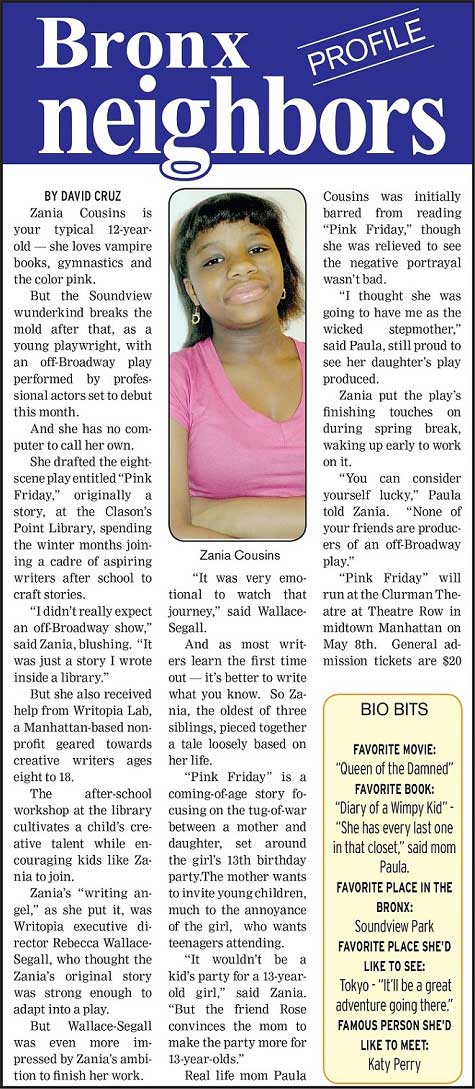

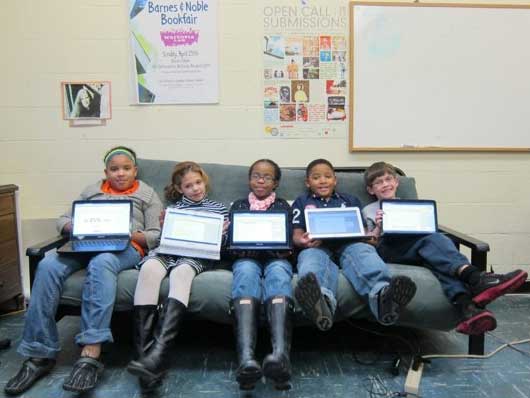
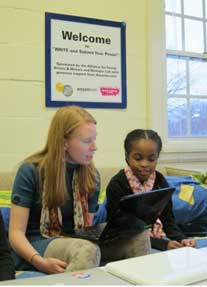 You will not find writer’s block in this room. The kids are little plot engines. They haven’t developed that doubt and self-loathing common to many writers, that fear that your work stinks, that you’ll be found out, that your approaching deadline will suffocate you, that there is nothing more horrible than a blank screen, with its pitiless cursor blinking like an unforgiving eye.?.?.?.
You will not find writer’s block in this room. The kids are little plot engines. They haven’t developed that doubt and self-loathing common to many writers, that fear that your work stinks, that you’ll be found out, that your approaching deadline will suffocate you, that there is nothing more horrible than a blank screen, with its pitiless cursor blinking like an unforgiving eye.?.?.?.